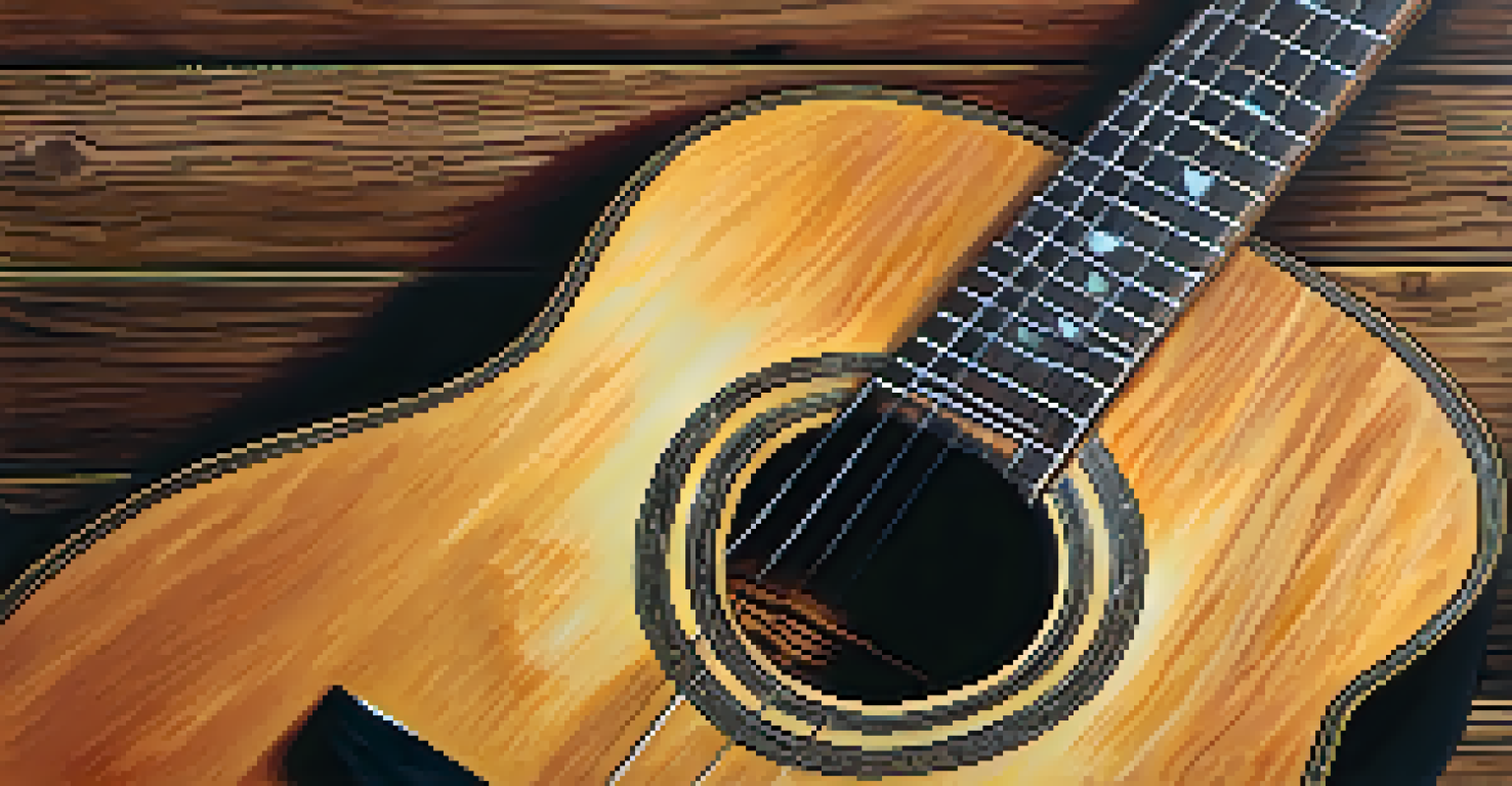Guitar in the World: A Tool for Cultural Dialogue

The Guitar: A Global Instrument with Local Roots
The guitar is more than just a musical instrument; it's a cultural icon that resonates with people worldwide. Originating from various string instruments, its evolution reflects diverse musical traditions, from flamenco in Spain to blues in the United States. Each culture brings its unique flavor, showcasing how the guitar can adapt while still embodying its roots.
Music can change the world because it can change people.
For instance, in Brazil, the guitar plays a central role in bossa nova, blending samba rhythms with jazz influences. Meanwhile, in India, the guitar has found a place in contemporary music, merging seamlessly with traditional sounds. This adaptability underscores the guitar's universal appeal and its ability to bridge cultural gaps.
As a result, the guitar has become a tool for cultural dialogue, allowing musicians to communicate and collaborate across borders. Its strings weave stories that transcend language barriers, creating a shared experience that unites diverse audiences.
Cultural Exchange Through Guitar Festivals
Guitar festivals around the globe are a testament to the instrument's role in cultural exchange. These events attract musicians from various backgrounds who come together to celebrate their love for the guitar. For example, the Montreux Jazz Festival in Switzerland showcases guitarists from different genres, creating a melting pot of musical styles.

During these festivals, artists have the opportunity to collaborate and experiment, leading to innovative sounds that reflect a fusion of cultures. The excitement is palpable as musicians share techniques, styles, and stories, enriching each other's artistry. Such interactions foster friendships and mutual respect among diverse cultures.
Guitar as a Cultural Bridge
The guitar transcends cultural boundaries, adapting to various musical traditions and allowing for rich cultural exchange.
Moreover, these festivals often include workshops and masterclasses, enabling attendees to learn from renowned guitarists. This sharing of knowledge not only promotes skill development but also deepens appreciation for the cultural backgrounds that shape different playing styles.
The Role of Guitar in Social Movements
Throughout history, the guitar has played a significant role in social movements and activism. From protest songs of the 1960s to modern-day anthems, the instrument has been a voice for change. Artists like Bob Dylan and Joan Baez used their guitars to inspire and mobilize people, proving that music can be a powerful tool for social justice.
The guitar is a miniature orchestra in itself.
In many cultures, guitar music accompanies protests and rallies, uniting individuals with a common cause. For example, in Latin America, folk guitarists have often sung about issues like inequality and human rights, resonating deeply with their audiences. This connection illustrates how the guitar can amplify voices that otherwise might go unheard.
Furthermore, the guitar's versatility allows it to adapt to various musical styles, making it an effective vehicle for conveying messages of hope and resistance. Whether in a small gathering or a large demonstration, the sound of a guitar can rally people together, fostering a sense of solidarity and shared purpose.
Guitar as a Tool for Education and Cultural Preservation
The guitar serves as an educational tool in many cultures, teaching not only music but also cultural heritage. Schools and community programs often use guitar classes to introduce students to traditional music, ensuring that these art forms are passed down through generations. For instance, in parts of Africa, young musicians learn to play traditional songs that tell their people's stories.
In addition to formal education, informal settings like family gatherings or community events often involve the guitar, allowing cultural practices to flourish. Elders pass down techniques and songs, creating a living history that enriches the community's identity. This process fosters a sense of belonging and pride in one's heritage.
Social Impact of Guitar Music
Throughout history, the guitar has been a powerful tool for social movements, uniting people and amplifying voices for change.
Moreover, as globalization continues to influence musical landscapes, the guitar helps preserve cultural identities. Musicians often blend traditional and contemporary styles, ensuring that their roots remain relevant in today's world. This dynamic interplay showcases the guitar's role as a bridge between the past and the present, making cultural preservation an engaging and evolving process.
The Guitar's Influence on Popular Music Genres
The guitar has been a driving force behind many popular music genres, shaping the soundscape of modern music. From rock to jazz, country to reggae, the guitar's versatility allows it to fit seamlessly into various styles. This adaptability has not only enriched these genres but also encouraged cultural blending and innovation.
Take rock music, for example, which heavily relies on electric guitars to create its signature sound. Pioneering artists like Jimi Hendrix and Eric Clapton infused their cultural influences into their music, inspiring countless musicians worldwide. Their unique styles exemplify how guitarists can draw from their backgrounds while contributing to a global musical narrative.
Similarly, genres like hip-hop have embraced the guitar, incorporating its sounds into beats and melodies. This cross-pollination highlights the guitar's ability to evolve and remain relevant in an ever-changing musical landscape, fostering a dialogue between genres and cultures. As a result, the guitar continues to be a central figure in the story of modern music.
The Emotional Connection of Guitar Music
Guitar music has a unique ability to evoke profound emotions, making it a powerful tool for connection. The sound of a strumming guitar can create a sense of nostalgia, joy, or even sorrow, transcending language and cultural barriers. This emotional resonance is why guitar music has such a universal appeal, often bringing people together in shared experiences.
For instance, think about a campfire gathering where friends gather to sing along to familiar tunes played on an acoustic guitar. This simple act fosters connection and camaraderie, illustrating the guitar's role in creating memorable moments. The shared experience of music can strengthen bonds and create lasting memories among diverse groups of people.
Guitar's Role in Education
As an educational tool, the guitar helps preserve cultural heritage by teaching traditional music to future generations.
Moreover, the guitar's ability to convey complex emotions through melody and harmony enables artists to tell stories that resonate deeply with listeners. From love ballads to protest songs, the guitar helps express the human experience in all its facets, reinforcing the idea that music is a universal language. This emotional connection enhances the guitar's role in cultural dialogue, as it allows individuals to empathize and understand one another better.
The Future of Guitar in Global Cultural Dialogue
As technology advances, the future of the guitar in cultural dialogue looks promising. Digital platforms allow musicians to share their work with a global audience, breaking down geographical barriers and fostering collaboration. Online communities and social media enable guitarists to connect, exchange ideas, and create music together, regardless of their location.
Moreover, the rise of virtual concerts and streaming services has made it easier for diverse musical styles to reach a broader audience. This exposure can lead to greater appreciation and understanding of different cultures, as listeners discover new sounds and stories through the guitar. The instrument continues to evolve, adapting to modern trends while retaining its cultural significance.

Looking ahead, the guitar will undoubtedly remain a vital tool for cultural dialogue. As musicians explore new genres and experiment with fusion styles, the guitar will continue to play a central role in shaping the future of music. This ongoing evolution reinforces the idea that the guitar is not just an instrument, but a bridge that connects us all through the universal language of music.